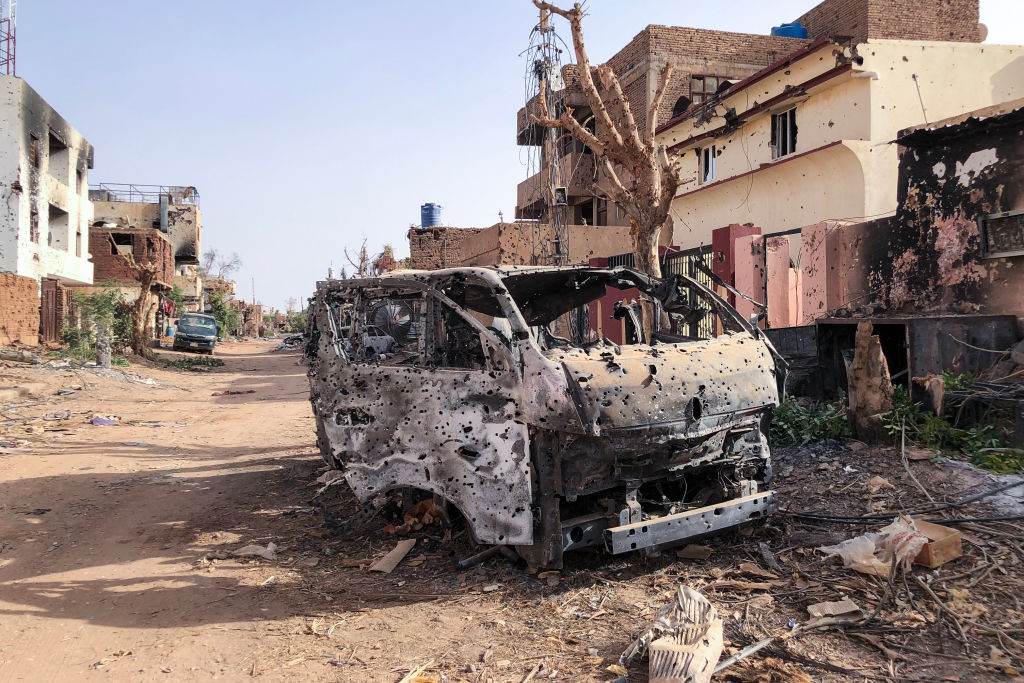ADF STAFF
In a recently released video, a member of the Sudanese Armed Forces (SAF) displays an empty crate that once held 120 mm thermobaric mortar shells. He points out the origin of the munitions, stamped with an address on the top: United Arab Emirates Armed Forces, Joint Logistics Command, Abu Dhabi.
As its devastating civil war drags on, Sudanese officials continue to blame the UAE for what they say is critical clandestine support for the paramilitary Rapid Support Forces (RSF).
The SAF is sharing its evidence: a variety of UAE weapons systems, ammunition, vehicles and other materiel support to the RSF. Any weapons imported into Sudan’s Western Darfur region would violate a United Nations arms embargo.
Cameron Hudson, an analyst with the Center for Strategic and International Studies, said the RSF’s war efforts depend on UAE supplies.
“If the UAE were to suspend all support to the RSF and were to tell its partners in the region not to support the RSF, I think that this war could be over very soon, quite frankly,” he told Voice of America for an October 11, 2024, report.
According to multiple reports, the SAF has received military drones from Iran, though the Sudanese government has denied it. The UAE continues to deny all allegations that it is supplying the RSF.
“The UAE is not providing any support or supplies to the Rapid Support Forces or to any of the warring parties in Sudan,” the foreign ministry told VOA.
More than a year and a half into the conflict, the world’s largest displacement crisis has seen about a fifth of the population — 11 million Sudanese — forced to flee their homes, while 25 million need humanitarian assistance as famine looms, according to the U.N.
Foreign military support to both sides is prolonging the fighting and raising the possibility that the war could spill over Sudan’s borders and destabilize the Horn of Africa.
In an October 11, 2024, letter to the U.N. Security Council, Sudan presented what it claimed was new evidence of the UAE’s military, logistical and financial support for the RSF.
The letter included images of captured heavy artillery ammunition boxes with the UAE listed as the recipient and trucks with Dubai license plates that the SAF said were used to transport weapons and ammunition. The SAF also said it had captured recently manufactured Emirati medicines and medical supplies from the RSF.
“These seized items are in the possession of the Sudanese Armed Forces and can be examined by UN experts,” the letter stated, according to the Sudan Tribune newspaper.
The letter also accused the UAE of recruiting mercenaries from several countries to fight alongside the RSF, while Sudan’s information ministry said in an October 14, 2024, statement that the UAE had facilitated “the transfer of wounded RSF fighters to receive treatment at Sheikh Zayed Hospital” in Abu Dhabi.
Zachary Fillingham, managing editor of international intelligence website Geopolitical Monitor, said the UAE’s support for the RSF reflects its stake in the outcome of Sudan’s civil war.
“Abu Dhabi is picking a side in the hope of protecting these interests, which include securing food supply chains, gold and other mineral exports, and developing a new port along Sudan’s Red Sea coast,” he wrote in an October 4, 2024, situation report.
Hudson said the UAE’s ambitions stem from its rivalry with Persian Gulf neighbor Saudi Arabia, as both countries believe that their national security goes beyond their physical borders.
“The UAE has had this competition with the Saudis in the Horn of Africa for many years,” he said. “It seems to be doubling down on its investment, not just in Sudan, but in Chad and Ethiopia, in Kenya, so I think the UAE wants to be the great power in the Horn of Africa.”

